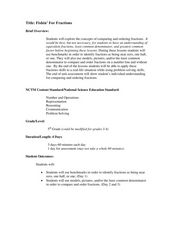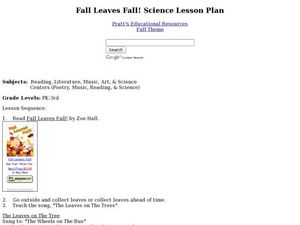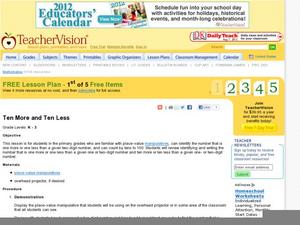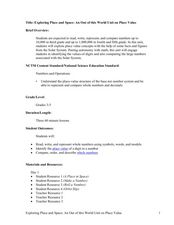Curated OER
Fishin' For Fractions
Fifth graders compare fractions. In this fraction lesson plan, 5th graders identify whether a fraction is closest to zero, half, or one and use common denominators. They put fractions in order and complete real-life fraction questions.
Curated OER
Number Chart and Number Line
First graders research strategies for identifying numbers through 100. In this number recognition lesson plan, 1st graders make games, create puzzles,and fill in missing numbers to practice number identification.
Curated OER
Play Dough Number Sentences
First graders receive a can of play dough and form it into numbers to make addition problems. They also learn the proper format for an addition sentence from left to right. This is a great hands-on math lesson plan for young learners.
Curated OER
Get On Board
Students create a ticket table illustrating the cost of tickets by alternative transportation. In this number sense lesson, students write number sentences to compare and contrast difference information in their chart. Students figure...
Curated OER
Fall Leaves Fall
Students explore fall leaves. In this leaf lesson, students collect leaves to investigate. Students also measure, compare and contrast, draw and look at leaves through a magnifying glass. Students sing songs and use movement in this...
Curated OER
Soak It Up
Students role play where they assume the role of business executives who must decide which of three prototypes of paper towels would be the best buy for consumers. Students compare three products to determine the best value by using...
Curated OER
Ten More and Ten Less
Get learners to analyze two-digit numbers based on place value, and use manipulatives to add and subtract both 1 and 10. A place value chart is available, and you can project it during guided practice. Through visualizing numbers,...
Curated OER
Patterns to the Rescue
Students watch "Cyberchase: The Poddleville Case" and analyze patterns. They complete a patterns assignment worksheet and then they make up patterns using numbers, shapes or colors, for their classmates to solve. They use patterns to...
Curated OER
Math: Football League Statistics
Students examine a soccer league final standings chart and then answer 12 questions based on the information provided. They calculate some answers in both fractions and percentages.
Curated OER
Comparing Amounts
In this mathematics worksheet, 1st graders identify who has more money. Then they write how much each person has and circle the one with more money. Students also place a group of coins on their desk and write down how much they have.
Curated OER
Numbers as Descriptors
Students use numbers as descriptors. For this mathematical inquiry lesson, students use numbers to describe, classify, and compare plants. Students are made aware that numbers can be used to describe things in the world around them.
Curated OER
Exploring Place and Space
Students explore number values by completing mathematical worksheets in class. In this decimals lesson, students identify the different place values a number has and the use of decimals to represent a fraction of a number. Students...
EngageNY
Displaying a Data Distribution
Pupils analyze a display of data and review dot plots to make general observations about the highest, lowest, common, and the center of the data. To finish, learners match dot plots to scenarios.
Curriculum Corner
Guest Teacher Plans (Grade 2)
Be prepared the next time you're in need of a substitute with a daily plan equipped with an assortment of activities covering subjects math, reading, word work, writing, and science.
Virginia Department of Education
Special Right Triangles and Right Triangle Trigonometry
Right triangles are so special! Use special right triangles to discover the trigonometric ratios. Pairs construct special right triangles and find the values of the ratios of the sides. In the process, they discover the ratios stay the...
Curated OER
Measurement and Conversion of Units in a Recipe
In a cross-curricular measurement and literacy instructional activity, your class will identify and compare cooking measurement instruments. They read a recipe and sequence a set of similar instructions in which the steps have been mixed...
Curated OER
Find 2/3
This short problem with representing fractions on a number line is more than meets the eye. Labeled only with the numbers zero and 1/4, a number line is used to locate the fraction 2/3. A solution can be found in multiple ways, but young...
S2tem Centers SC
Investigating Chance Processes of Probability
How likely is it that the school cafeteria will serve chicken tomorrow? Discover the concept of probability with the roll of the dice. Pupils evaluate the liklihood of several statments about everyday life. Then, a mathematical...
Curated OER
How Fast is Usain Bolt?
Revisit the 2012 Summer Olympics by having seventh graders calculate the unit rate sprinting speed of the 100-meter gold medal winner.
Curated OER
Hand Span and Height
Is there a relationship between hand span width and height? Statisticians survey each other by taking measurements of both. A table that can hold data for 24 individuals is printed onto the worksheet, along with questions for analysis....
Curated OER
Place Value
Second graders use physical models to represent and demonstrate place value concepts by using base-ten blocks and hundreds charts. They compare numbers to see which number is smaller or larger and put numbers in order from smallest to...
Curated OER
Meter Marker Mania
Pupils identify integers as rational and irrational numbers. For this algebra lesson, students measure and construct number lines using positive and negative integers. They convert between decimals and fractions.
Curated OER
Multiplying by Two-Digit Numbers
In this mathematics worksheet, 6th graders find the product of a given equation. Then they use an array and find the sum of the partial products. Students also use zeros as place holders when necessary.
Curated OER
Two-Digit Quotients
For this mathematics worksheet, 6th graders find the quotient for each problem. They estimate first and identifying which number they will use. Then, students divide the problem and multiply to check.

























